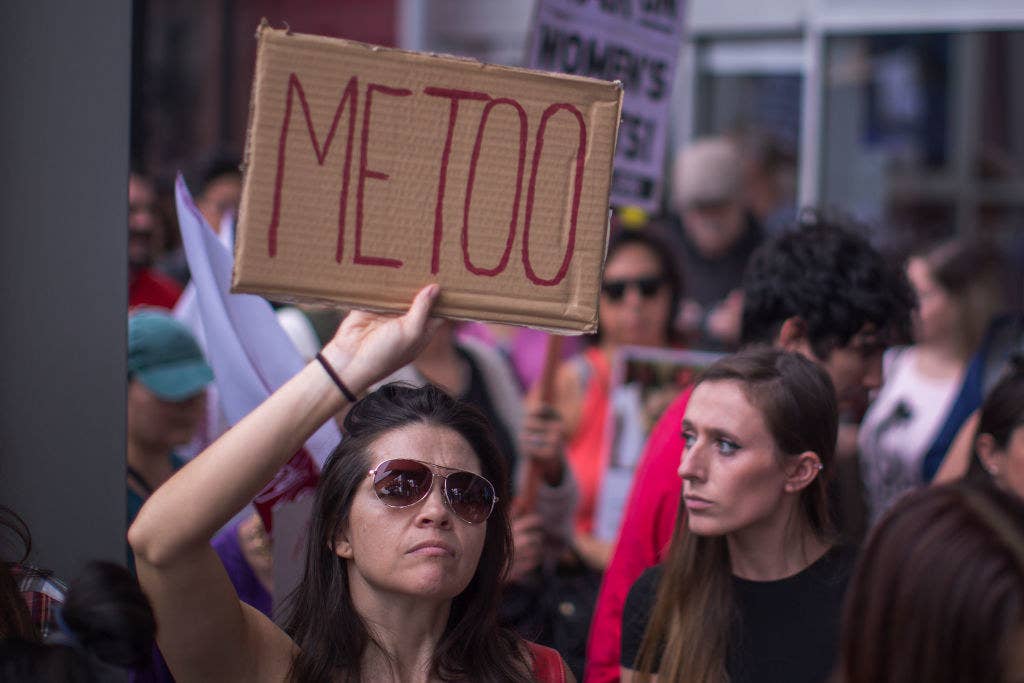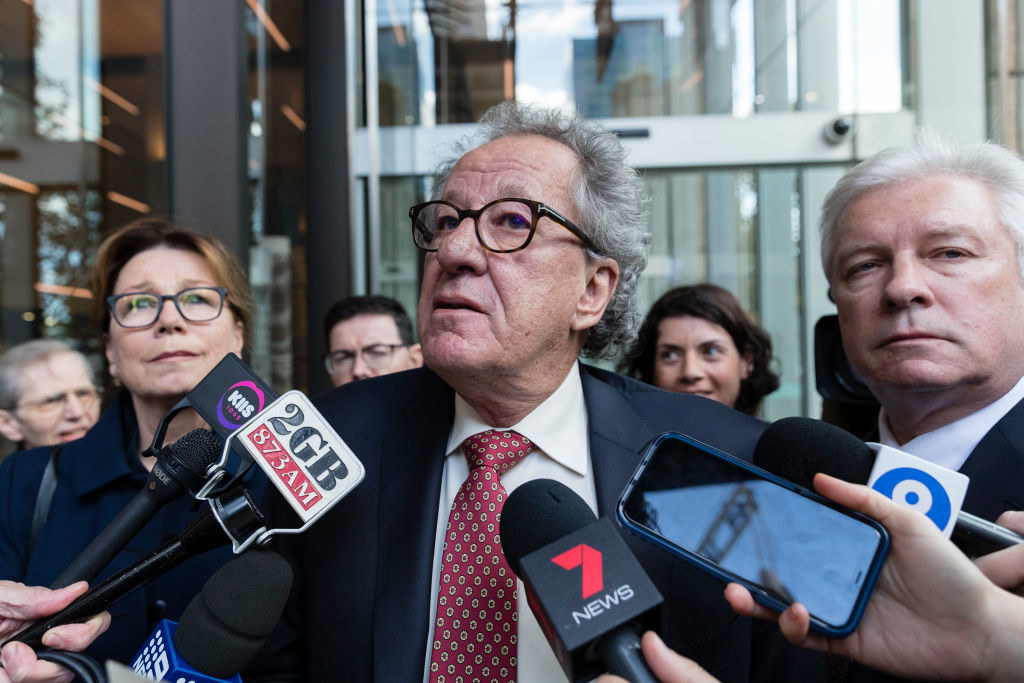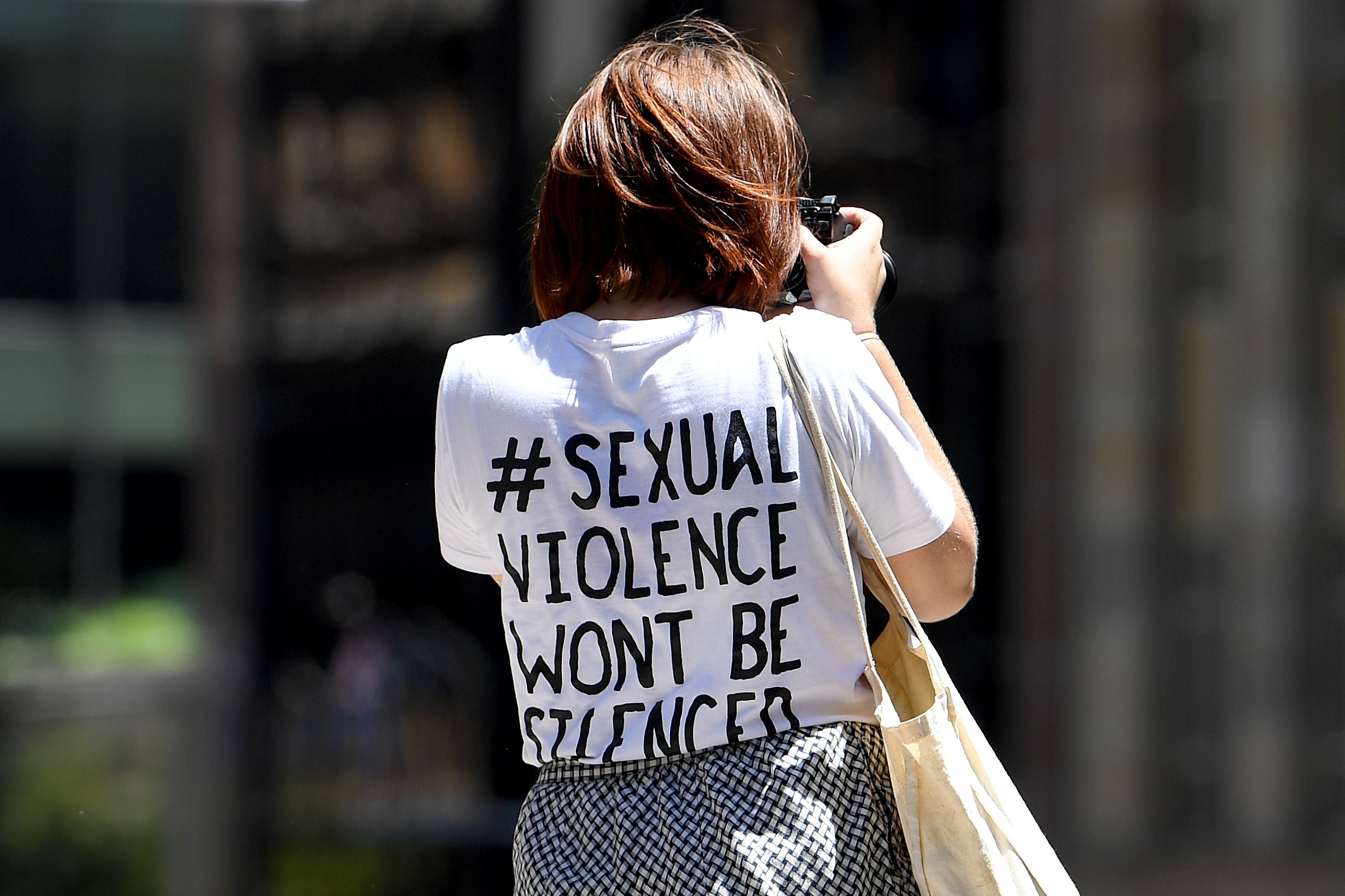
In the United States, allegations against Harvey Weinstein propelled a flood of investigations and the downfall of more than 200 public figures, but there has been a relative dearth of #MeToo stories published in Australia — even accounting for differences in population — where an astonishing 85% of women have experienced sexual harassment.
Most high profile #MeToo stories in Australia, excluding allegations made about celebrity gardener Don Burke, have been overshadowed by legal proceedings. Wolf Creek actor John Jarratt, who was accused of rape in News Corp tabloid the Daily Telegraph, launched and then dropped defamation proceedings against the newspaper after he was found not guilty. But the newspaper is still in the midst of an appeal against film star Geoffrey Rush, who successfully sued for almost $3 million over allegations he behaved inappropriately towards a costar during a Sydney Theatre Company production of King Lear. Meanwhile, former Home and Away star Craig McLachlan’s defamation proceedings against Fairfax, the ABC and a former costar are on hold while he faces criminal charges in court.
BuzzFeed News asked a survivor, journalist, editor, lawyer and academic about how hard it is to tell #MeToo stories in Australia.

The editor
“We have to weigh up how much we’re willing to risk and to spend for a story that may never see the light of day.”
Junkee music editor Jules LeFevre says it is “wildly frustrating” trying to cover stories of sexual harassment and assault in the arts.
“I don’t think Australia’s music industry has even begun to reckon with #MeToo,” LeFevre told BuzzFeed News. “There are awful stories out there, some that are effectively open secrets within the industry, but it is simply impossible to report on them at the moment.”
LeFevre said once allegations are “racing across Twitter” it is difficult to cover them without being “immediately targeted by lawyers”.
“In one case we received a warning before we had even published the story, just because the subject’s legal team knew we were planning to write about it,” she said. “There have been music journalists contacted by lawyers recently about things written on social media that don’t even mention the name of the artist or artists involved in certain allegations — that’s how alert the industry is.”
A single legal letter can be enough to kill a story, she said, particularly for a small publisher with limited funds. “We have to weigh up how much we’re willing to risk and to spend for a story that may never see the light of day.”
These stories took time to tell and the delays irritate those who want to see perpetrators held accountable, she said.
“We’ve been accused of covering for abusers, for silencing victims,” she said. “That is hard to read, as we’re trying to do all we can to report on these stories, but sometimes it is simply too much of a risk to our publication, and to our own careers.”
LeFevre said Junkee was “extremely careful” in pieces dealing with allegations, from ensuring the tone is as straight as possible down to the related links, hyperlinks and article URLs, “which can all be included in defamation proceedings”.
LeFevre said she is very upfront when people contact her with allegations.
“I tell them straight away that the likelihood that we’ll be able to publish them is low,” she said. “Most of the time they understand, but it’s a horrible conversation to have.”

The journalist
“The stories are there, but the legal system is preventing journalists from telling them.”
One journalist at a news organisation in Australia, who asked not to be named, spent more than two years speaking to sources about their experiences — many of whom had similar allegations about the same person, which for legal reasons the publication has so far been unable to publish.
“In practice this means that in Australia, unlike in America, it’s not just about a journalist’s motives, or whether they did everything they could to get the story, or whether that story, like the story I have been working on, has been verified to journalistic standards,” she told BuzzFeed News. “It’s about whether or not the journalist can prove that the story is true to the legal standards required by a court, and whether their masthead has the resources to fight through the courts to prove it.”
Cases of rape, sexual assault and harassment are “notoriously hard to prove”, she said, and powerful people often have a lot more money to spend in court than many news outlets.
“Even if you can prove it, those people could keep those outlets — and their sources — in court for years,” she said. “That’s a big risk to take, especially if precedent suggests you won’t win.”
Before embarking on a #MeToo investigation she asks: “Do I have the capacity and resources to tell this story and to do it justice?”
Not just time, energy, and manpower, but legal experts to manage risk as well as “an understanding of how to talk to, support and protect traumatised people”.
“These people are taking huge personal risk and could also be sued personally for defamation,” she said. “To report a #MeToo story ethically and sensitively the survivors need to feel safe at all times — and to make them feel safe, as a journalist (and a human), you want them to know they are in control of how their story is told, and you want to be available to them.”
Getting to the truth of the allegations, however, requires survivors to tell a journalist — “a stranger” — over and over again about something horrible that happened to them.
“If a detail changes, even a small one, you have to call them on it,” she said. “That feels awful for everyone.”
The victim needs to let the journalist call their friends and family to talk about something “deeply personal and horrifying that happened to them” and then show the journalist “old texts, old photos, old diaries” to be photocopied.
“And after all that, you’re going to ask them to sign a legal document saying they will go to court over it, for as long as it takes, even if it could take over their life,” she said. “No wonder so many people who have come forward in the US are wondering if it was worth it.”
The journalist said her organisation’s lawyers have said the Rush verdict “raised the risk level” for #MeToo stories.
“This isn’t about journalists being lazy or newsrooms being frightened — it’s about a law which is making it almost impossible for verified stories like ours to be told without taking on unreasonable levels of risk.”
These stories should take a long time to put together as the “stakes are so high”, she said. “But once you’ve got the story, it shouldn’t be so hard to publish.”

The survivor
“I thought we could all tell our stories at once.”
On Oct. 18, 2017, newsreader Tracey Spicer, who later cofounded NOW Australia, sent a widely publicised tweet, calling for stories about sexual offenders.
The day after Spicer’s tweet, Frances — a pseudonym to protect her privacy and that of her alleged abuser — decided to message Spicer with her story, about which she had stayed silent for more than a decade.
“Me too,” her Facebook message, seen by BuzzFeed News, began. “I’m sure I won’t be the only one to come forward about [the name of a media personality].”
Spicer replied within 24 hours: “[Frances], thank you so much for sharing this information. In fact, I have had many women come forward about him. He should be held to account.”
Frances detailed the behaviour of the man for whom she worked as a receptionist in her 20s. She alleged he cornered her at a work party, “stuck his tongue down her throat” and later asked her to perform oral sex on him, to which she obliged, fearing for her job security as she was being paid cash in hand and couldn’t afford to be unemployed.
Spicer, who says she has received more than 2,500 disclosures since her first tweet, replied sympathetically, describing the alleged perpetrator as a “serial sexual predator”.
“He now goes to the top of our list,” she wrote, before checking that Frances had support and acknowledging that recounting these experiences can “bring it all back”.
“I now have the resources of the ABC and Fairfax investigative units behind this. May I contact you in a week?” Spicer wrote, adding that Frances was courageous and reiterating that it wasn’t her fault.
Frances thanked Spicer for her important work.
Spicer asked for the names of other women who worked with Frances, and she sent them through, adding that they were older than her and “didn’t seem to be having the same problem” with this man.
More than a week passed without Frances hearing from Spicer. She checked in to see “how things are progressing”, and Spicer replied saying she now had the support of “several investigative units, as well as three sets of lawyers”.
Frances consented for her details to be passed onto reporters at Fairfax and the ABC — “Sure, happy to do anything I can to help” — and said she would need more information before deciding if she would go on the record.
“One day the messages just stopped and that was that,” Frances told BuzzFeed News.
In the two years since, Frances has written out various drafts of a message to Spicer, each expressing her disappointment.
“I would like to think that she had good intentions and I wanted to say something but I didn’t want to make her feel worse,” she told BuzzFeed News.
Frances said that Spicer’s initial response “appealed” to her as it was clear there would be other women involved in a potential story.
“I thought we could all tell our stories at once,” she said. “I felt like this person had the ability to do something about it. Otherwise I would have just kept it to myself as it is something really embarrassing to me.”

The academic
“The price of any fairness in these sex discrimination matters is often one’s voice.”
Associate professor at the University of New England Law School Skye Saunders says under the federal Sex Discrimination Act 1984 women who have been subjected to workplace sexual harassment must generally participate in a conciliation process with their employer and/or the perpetrator as a prescribed “first step”. This process is confidential, which she said “can be a double-edged sword”.
“On the one hand it can protect the complainant from any unwanted and inappropriate scrutinisation around an often humiliating and painful experience,” Saunders told BuzzFeed News. “On the other hand, in choosing to reach a confidential agreement, the price of any fairness in these sex discrimination matters is often one’s voice.”
Survivors are often required to sign a deed that strips them of the opportunity to speak publicly in any way about the subject of their complaint, the conciliation process and the nature of the agreement.
“It always reminds me of the scene in The Little Mermaid where Ariel signs a binding contract with Ursula in exchange for her voice, and a woman’s voice is a powerful and precious gift, particularly in the context of owning her personal experiences.”

The lawyer
“The ability to purchase silence obviously corrupts the process.”
Michael Bradley, managing partner of Marque Lawyers, said people who are sexually harassed usually lodge an internal complaint, which then triggers an administrative law process that is “geared entirely towards” protecting the interests of the perpetrator, not the complainant.
“The system takes all of the power and control away from the complainant,” Bradley told BuzzFeed News. “They have no rights in that system whatsoever and most of the time they’re not even entitled to be informed of what is going on.”
The system was not designed “in contemplation” of sexual harassment and complainants end up feeling “completely disenfranchised and alienated” in what can be a traumatic process, he said.
Nondisclosure agreements offered businesses settling sexual harassment claims the ability to pay to make sure complainants don’t end up going public with their story.
“The ability to purchase silence obviously corrupts the process and makes sexual harassment and whatever else a transaction,” Bradley said. “In business it is always better to settle disputes than to litigate them.”
Relative to the size of most businesses, Bradley said, these matters were “relatively cheap” to settle.
“[NDAs] mitigate against any form of cultural change and makes it far more likely that nothing good is going to come from the complaint other than the victim getting some financial compensation,” he said.
Bradley said there were many factors to take into account before encouraging a client to go public with their story.
“If working with ethical media who are going to both do the work properly and fully and behave both ethically and empathetically then [media coverage] can have a really powerful impact in persuading the perpetrator that the courts are not the right place to resolve the issue,” he said.
